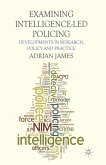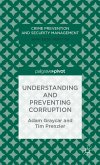This book provides a critical analysis of the employment of intelligence-led policing (ILP) strategies. It aims to convey a better understanding of some of the realities of the police investigative and criminal intelligence worlds, and to examine what the story of intelligence-led policing tells us about policing and the police organization.
"This book makes a significant and original contribution both to our understanding of ILP and to the implementation of policing policies. James' observations, insights and conclusions deserve serious reflection and contemplation from police researchers and those holding administrative or managerial positions within the police [...] As Robert Reiner states in the foreword, James' book is a mine of information and insights on policing in general and, especially, on ILP in Britain. One can indeed learn a great deal from him and his book." - Policing and Society
"The book is the first comprehensive analysis of NIM, and as such makes a significant original contribution to knowledge and understanding of contemporary policing policy and the functioning and reform of police organizations [...] The author has drawn on both his distinguished career as a detective and manager of information, and his academic education. The product of these influences is a book that should be a long-lasting reference-point for debates about policing." - Robert Reiner, Emeritus Professor of Criminology, London School of Economics, UK
"A timely and important contribution to the literature on police theories, this book presents an insider account of the development and recent history of Intelligence-Led Policing (ILP) in Britain. In so doing, James comprehensively analyses ILP, by building on the evolutionary and piecemeal path that the modern police service has trodden to arrive at asituation which he describes as the 'relative failure of ILP'. Interestingly, the use of an impressive range of literature and sources from the coal face of policing leads to provocative conclusions, not only about the police themselves but also about broader issues of criminal justice policy and investigative science. The book will certainly become required reading for police managers and I commend it to students of policing, security studies and the broad field of criminology." - Denis Clark, Charles Sturt University, Australia
"This is a timely and highly significant book on policing and intelligence; it is useful not just to criminologists, academics, students, but to anyone interested in contemporary policing, policing history generally, intelligence systems broadly and the management of change, Wide ranging in theory and with new empirical information as well as correcting some mistaken time lines (themselves an intelligence tool) this is hugely relevant for current thinking on reforming policing broadly and police intelligence. This suggests another narrative of change from within as opposed to the broad political dominant narrative of police leadership failure and imposed change from outside. It will inform and encourage a wider debate. Adrian is to be congratulated on his contribution to our thinking that takes us far beyond the shorthand of the 'snooper's charter' of current legislative shorthand." - John G.D. Grieve, University of Portsmouth, UK and Professor Emeritus London Metropolitan University, UK
"This book provides important insights in two key areas: the substantive debate around intelligence-led policing; and, the mechanics and politics of policy development. As such it will be of value within the policing sphere and more broadly for public policy studies. The book is based upon strong and unique access to key figures and policing personnel associated with the National Intelligence Model and intelligence led policing policy and implementation. It will be an important resource for those undertaking detailed academic research and analysis, for police practitioners, and for those involved with (or studying) policy practice and implementation."
- Tim John, University of Glamorgan, UK
"At a time when Britain is undergoing one of its periodic bouts of worry about policing and intelligence, Adrian James has provided a timely and critical analysis of 'intelligence-led policing'. Drawing on long experience as a practitioner, he has made excellent use of both academic and official literatures as well as extensive interviews in order to produce a fascinating account. James explains how the hopes of ILP's proponents have largely foundered on a mixture of police conservatism, a confusion of differing objectives and a generalised difficulty in understanding the value of 'intelligence'." - Peter Gill, University of Liverpool, UK
"The book is the first comprehensive analysis of NIM, and as such makes a significant original contribution to knowledge and understanding of contemporary policing policy and the functioning and reform of police organizations [...] The author has drawn on both his distinguished career as a detective and manager of information, and his academic education. The product of these influences is a book that should be a long-lasting reference-point for debates about policing." - Robert Reiner, Emeritus Professor of Criminology, London School of Economics, UK
"A timely and important contribution to the literature on police theories, this book presents an insider account of the development and recent history of Intelligence-Led Policing (ILP) in Britain. In so doing, James comprehensively analyses ILP, by building on the evolutionary and piecemeal path that the modern police service has trodden to arrive at asituation which he describes as the 'relative failure of ILP'. Interestingly, the use of an impressive range of literature and sources from the coal face of policing leads to provocative conclusions, not only about the police themselves but also about broader issues of criminal justice policy and investigative science. The book will certainly become required reading for police managers and I commend it to students of policing, security studies and the broad field of criminology." - Denis Clark, Charles Sturt University, Australia
"This is a timely and highly significant book on policing and intelligence; it is useful not just to criminologists, academics, students, but to anyone interested in contemporary policing, policing history generally, intelligence systems broadly and the management of change, Wide ranging in theory and with new empirical information as well as correcting some mistaken time lines (themselves an intelligence tool) this is hugely relevant for current thinking on reforming policing broadly and police intelligence. This suggests another narrative of change from within as opposed to the broad political dominant narrative of police leadership failure and imposed change from outside. It will inform and encourage a wider debate. Adrian is to be congratulated on his contribution to our thinking that takes us far beyond the shorthand of the 'snooper's charter' of current legislative shorthand." - John G.D. Grieve, University of Portsmouth, UK and Professor Emeritus London Metropolitan University, UK
"This book provides important insights in two key areas: the substantive debate around intelligence-led policing; and, the mechanics and politics of policy development. As such it will be of value within the policing sphere and more broadly for public policy studies. The book is based upon strong and unique access to key figures and policing personnel associated with the National Intelligence Model and intelligence led policing policy and implementation. It will be an important resource for those undertaking detailed academic research and analysis, for police practitioners, and for those involved with (or studying) policy practice and implementation."
- Tim John, University of Glamorgan, UK
"At a time when Britain is undergoing one of its periodic bouts of worry about policing and intelligence, Adrian James has provided a timely and critical analysis of 'intelligence-led policing'. Drawing on long experience as a practitioner, he has made excellent use of both academic and official literatures as well as extensive interviews in order to produce a fascinating account. James explains how the hopes of ILP's proponents have largely foundered on a mixture of police conservatism, a confusion of differing objectives and a generalised difficulty in understanding the value of 'intelligence'." - Peter Gill, University of Liverpool, UK








